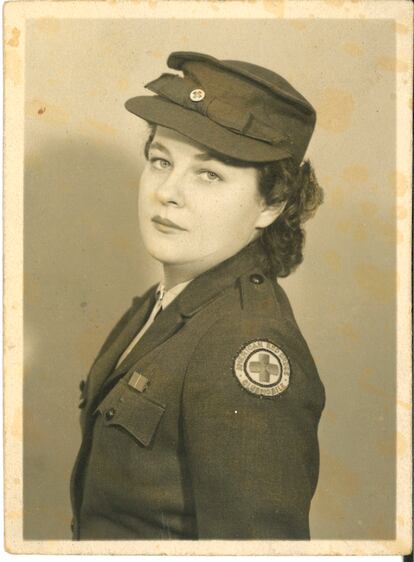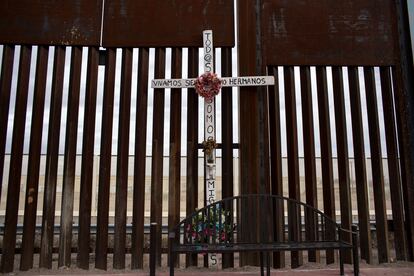Luis Alberto Urrea, novelist and essayist: ‘Trump made the border a theater of horrors’
The Mexican-American author tells EL PAÍS that, in the United States, there’s an openly racist attitude against Spanish, his native language. In his latest novel, he has opted to depart from his usual subject matter — the U.S.-Mexico border — to explore the most intimate elements of his mother’s life

Luis Alberto Urrea, 68, is one of the most important Hispanic-American storytellers of our time. He’s part of an extraordinarily diverse literary tradition, whose hallmarks — despite the diverse origins of its members — demonstrate a solid unity. This is due to a presence which is both symbolic and real: Spanish. It’s a language that many of them have lost, but which continues to shape — even in its absence — their literary vision.
Urrea’s world is the border that separates Mexico from the United States, the wounded border that Carlos Fuentes spoke of, an open scar that has never stopped bleeding. It’s a zone of friction, marked by racism, violence, injustice, and corruption. Urrea is the author of 18 books, including five volumes of poetry, two books of memoirs (Wandering Time and Nobody’s Son) and two collections of stories. The core of his work consists of six novels, three of which make up his border trilogy.
“We Urreas are of Basque origin,” the writer points out, at the beginning of the conversation with EL PAÍS, which takes place in the café of a Chicago hotel. “My ancestors arrived with the conquerors. My mother was American and my father was Mexican. When they got married, they went to live in Tijuana, where I was born. We lived in a dirt alley at the top of a hill in Colonia Independencia, in a very humble house that my grandfather built. It had a little garden. I remember that there was a fake medieval castle [in the area] and, at the end of the street, someone had a trained bear. In the house next door, there was a crazy man who — when he got drunk — would take out a gun and shoot at the moon. My parents returned to San Diego when I got sick with tuberculosis.”

EL PAÍS asks him how he became a writer. “We lived in a very violent, poor neighborhood,” he reflects. “Clashes between whites, Chicanos and Blacks were constant. I barely left the apartment. I spent the day reading. My mother always wanted me to be American, but my father was 100% Mexican. Thanks to her, I discovered Dickens, Mark Twain and Rudyard Kipling. Another important influence was my stepbrother, who has since died. He was addicted to science fiction and sent me books by Ray Bradbury.”
Speculative fiction was destined to play an important role in Urrea’s birth as a writer thanks to a stroke of luck, when his creative writing professor gave one of his short stories to author Ursula K. Le Guin. “Le Guin was teaching a workshop as a writer-in-residence [at the university]. When she read the story, she wanted to meet me. She immediately became my mentor and got the story placed in an anthology.”
Another important influence — this time coming from the Mexican-American literary tradition — was the figure of Rudolfo Anaya, the celebrated author of Bless Me, Ultima (1972), one of the essential works of the Chicano canon. When asked which other American writers of Latin origin are important to him, Urrea — aware that there will be many names he will forget to mention — lists John Rechy, Rolando Hinojosa-Smith, Piri Thomas, Sandra Cisneros, Ana Castillo, Julia Álvarez and the poets Jimmy Santiago Baca and Martín Espada.
As a narrator, Urrea demonstrates the same level of effectiveness every time he crosses the porous border between fiction and nonfiction. His first book — Across the Wire (1993) — is a relentless chronicle of life on the border. “It’s a tragic story,” he points out, evoking one of the key episodes in the text. “I was the first in my family to go to college. When I graduated, my father told me he would give me $1,000. His bank was in Rosario, [in the Mexican state of] Sinaloa. He went there, driving seven hours without rest, but on the way back, he was killed. Nobody knows what exactly happened. When the police arrived, he was still alive, although he was soaked in blood and urine, so they didn’t want to touch him. They didn’t find the money, which they no doubt would have kept. They located a cousin of mine and called an ambulance. In the end, my cousin found the money, but the ambulance never arrived. I used the money to [secure] my father’s body and cover the funeral expenses.”
This story is illustrative of Urrea’s way of narrating. His chronicles of the border are both atrocious and truthful. A year after his non-fiction debut, he carried out his first foray into the novel. In Search of Snow (1994) is “a portrait of Arizona in the 1950s, with the story of the friendship between two boys from both sides of the border — one Mexican and the other North American — who search for grace, while lost in the desert.”
In his next two titles — By the Lake of Sleeping Children (1996) and The Devil’s Path (2004) — he returned to non-fiction. “By the Lake of Sleeping Children alludes to a time of heavy rains. People were rummaging through a garbage dump for useful things. On the Tijuana side of the border, there’s a hill where babies and children are buried, away from the place where adults are buried. And, with so much rain, it filled with water and formed a lake. The babies’ coffins began to open up and seagulls came down to devour the bodies.”
The trilogy closes with The Devil’s Highway (2004), a book that’s currently in its 40th print run. In this chilling report, Urrea narrates — with painful precision — the fate of 26 men who tried to cross the border, half of whom died while making the attempt. A finalist for the Pulitzer Prize, The Devil’s Path is a necessary book that warns about an unavoidable reality that’s one of main battles in the ongoing presidential elections: illegal immigration. “The events [I write about in the book] happened in 2001. So many years have passed since that tragedy occurred. For me, the border changes and it also doesn’t change. Trump turned it into a theater of horrors and abuse, including with the forced separation of mothers and children as a form of coercion.”
After a brief break, the writer began to muse about the idea of the border disappearing. He tells EL PAÍS about a story that he wrote which plays with this concept: The Night Drinker (2009). It was published in Timothy McSweeney’s Quarterly Concern, in a special issue dedicated to the catastrophes resulting from climate change.

“The title is an allusion to Xipe Tótec, the [Aztec] god who wore the skin of victims of human sacrifices. He drank their blood when it fell in the form of rain. When I wrote the story, I thought that drug traffickers were making human sacrifices without faith or religion — just violence. If Xipe Tópec were to return [in the future] — with the seas rising — he would find that the rain has made the border disappear. And so what?” he exclaims, questioning the man-made division.
Urrea continued to bear witness to life on the border in his body of work, addressing different aspects of a changing reality from the perspective of his family history. In The Hummingbird’s Daughter (2005) and Queen of America (2011), he rescues the historical figure of his aunt, Teresita. She was a healer who practiced her trade among the Yaqui Indigenous people. And, through Into the Beautiful North (2009), he recounts the adventures of a young woman who repeatedly crosses the border, trying to restore the lost balance between the two sides.
The House of Broken Angels (2018) — his most recent novel before Good Night, Irene (2003) — is a family saga inspired by the death of his brother. “He was dying of cancer when the matriarch of the family died. We decided to have a party, a bit like Mark Twain’s farewell when Tom Sawyer glimpses the end of his life.”
Urrea speaks Spanish with a precision and fluency that’s only possible when the language is your mother tongue. However, all of his work is written in English. Is there a contradiction in this?
“There’s an openly racist attitude against Spanish in this country,” he affirms. “My intention is to present a world that’s expressed in Spanish to readers who don’t speak our language, by using theirs. I want to represent us in this country that has very strange opinions. There’s also an element of respect. I don’t want to be mystical, but for me, Spanish is something sacred, almost spiritual. I write in English about things that happened in Spanish.”
Good Night, Irene marks a turning point in the career of Luis Alberto Urrea. For the first time in his life, he moves away from the theme of the border, to instead pay tribute to his mother, who died in 1990. “One day, I realized that the world I’ve always represented is that of my father, even though my mother has always been so present in my life.”
“Going over everything she experienced was very difficult for me,” he sighs. “She cried every night. She screamed in her sleep. She was devastated by what she experienced during World War II, so I set out to follow in her footsteps and conduct an in-depth investigation into everything she did as a special member of the Women’s [Army] Corps. I visited all the places in Europe that she’d been to. My mother always talked about what she experienced with her friend Jill, who appears as Dorothy in the novel.”
“My wife, Cindy, helped me throughout the research process. She was the one who located Jill, who didn’t die in the accident I talk about in the novel. My mother kept letters and photos in a trunk that she didn’t want anyone to see. There, she preserved the graphic testimony of what she saw in the Buchenwald concentration camp, when she went in with the forces that liberated it. And then, there was her tragic love story with a pilot, who died in combat.”
“Suddenly,” he recalls, “we discovered them together in a photo taken in Cannes. No one in my family knew anything about it, but her friend, Jill — who was 94 when we went to see her — told us. ‘It was a war,’ she said. ‘We all had men.’ The man who was with her in the photos was named Jake. That’s when the challenge began. How do you write a novel about your mother’s sexual life, about an episode that you know nothing about? At the University of Illinois Urbana-Champaign, there’s a documentation center: they invited us to spend a day reviewing the papers that my mother’s friend had deposited there.”
Good Night, Irene is a powerful narrative, resulting from an arduous process of research into a rarely-visited aspect of the war: the role that women played as a psychological support force. “No one talks about them. It was a service similar to that of the Red Cross. Their mission was to serve coffee and donuts to combatants when they returned from the front. Who would want to write about something like that? But it was something very real, which marked my mother’s life — and that of many women — forever. They started during World War II, then continued in Korea and ended in Vietnam.”
The novel has been received as the contribution of a Latino who has enriched the central core of North American literature. Urrea is quick to clarify that this isn’t a permanent change of scenery. His next book — The Zebras of Tijuana — will mark his return to the border, the primary setting of his work. But this doesn’t mean that Good Night, Irene implies a change of position, much less an exercise in appropriation. What it is, rather, is an urgency that had to be addressed, a challenge that, after many years of living with it, required attention. The book encompasses the challenge of delving into the most intimate corners of the secret history of his mother, offering a fictionalized account of what she and an entire group of women experienced. They played a crucial role in a scenario in which only the presence of men was taken into account.
Sign up for our weekly newsletter to get more English-language news coverage from EL PAÍS USA Edition
Tu suscripción se está usando en otro dispositivo
¿Quieres añadir otro usuario a tu suscripción?
Si continúas leyendo en este dispositivo, no se podrá leer en el otro.
FlechaTu suscripción se está usando en otro dispositivo y solo puedes acceder a EL PAÍS desde un dispositivo a la vez.
Si quieres compartir tu cuenta, cambia tu suscripción a la modalidad Premium, así podrás añadir otro usuario. Cada uno accederá con su propia cuenta de email, lo que os permitirá personalizar vuestra experiencia en EL PAÍS.
¿Tienes una suscripción de empresa? Accede aquí para contratar más cuentas.
En el caso de no saber quién está usando tu cuenta, te recomendamos cambiar tu contraseña aquí.
Si decides continuar compartiendo tu cuenta, este mensaje se mostrará en tu dispositivo y en el de la otra persona que está usando tu cuenta de forma indefinida, afectando a tu experiencia de lectura. Puedes consultar aquí los términos y condiciones de la suscripción digital.








































